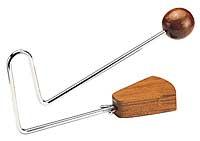milque·toast (mĭlk´tōst)
n.
One who has a meek, timid, unassertive nature.
[After Caspar Milquetoast, a comic-strip character created by Harold Tucker Webster (1885-1952).]
milquetoasty adj.
Word History: An indication of the effect on the English language of popular culture is the adoption of names from the comic strips as English words. Casper Milquetoast, created by Harold Webster in 1924, was a timid and retiring man named for a timid food. The first instance of milquetoast as a common noun is found in the mid-1930s. Milquetoast thus joins the ranks of other such words, including sad sack, from a blundering army private invented by George Baker in 1942, and Wimpy, from J. Wellington Wimpy in the Popeye comic strip, which became a trade name for a hamburger. If we look to a related form of popular culture, the animated cartoon, we must of course acknowledge Mickey Mouse, which has become a slang term for something that is easy, insignificant, small-time, worthless, or petty.



